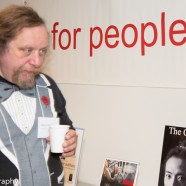
Ned Halilovic is a refugee. His earliest memories are of a war zone, where people were killing one another over their religion and nationality. Just like today’s refugees from Syria and Afghanistan, only Ned’s war was a generation earlier, and closer to home.
“I was born in ’86 in a small town in southern Europe, Sarajevo, Bosnia-Herzegovina,” he says, as if anyone alive in those years could have not heard of Sarajevo. “In ’92 the civil war broke out and my family and I were there during the siege. We were there from ’92 to the end of ’96, near the end of the war.”
His earliest memories are of living in the basement of their house to evade the snipers. There was no electricity in the basement, no running water. Some of the most harrowing times where when they had to go outside to get water to bring home.
“Almost every day we would go with two-gallon milk canisters, and the fire truck would park behind a building – that way the shelling couldn’t get to them,” Ned remembers. “A lot of times the shells would still drop on innocent people.”
Despite the ethnic and religious killing going on around them, he said, people clung to what their city had always been. “Sarajevo really was a multiethnic town,” he says. “On one street, you could find a synagogue, the cathedral, the mosque, the church,” Ned says. “Really, what we saw during that time was the strength of people of different religions, living.”
Then, when he was about 10, his family crawled through the so-called Tunnel of Hope, a narrow, 600-meter tunnel, secretly dug under the airport by people he calls “the civilian army,” to break the siege of Sarajevo.
“That was the only way in or out of the city. There were no airplanes. The airport was shut down,” says Ned. “Throughout the war it was used. Presidents have gone through that tunnel.” In his case, the tunnel led to safety and freedom, first in Croatia, then Germany, and finally in Seattle, Washington, where he is today.
Nothing after would be as harrowing as seeing his sister being shot at by a sniper, but life was not easy for an adolescent, finding himself a stranger in a strange land, twice. “It was rough. I was in 7th Grade. People look at you differently,” he says. “At that time immigrants were still pretty fresh to this area, especially from Eastern Europe. We got picked on a lot. Because kids can be pretty cruel.”
“I did not adjust as quickly as I thought I would. I thought kids were kids, but it turned out not to be that way for the first couple of years.” Then he adds, “I use thinking about those days to get ahead now.”
Ned learned English from the TV, turning on the Closed Captioning and watching how the actors and announcers formed the words.
Soccer, a game he had played his whole life, was the key to finding his place in America. “The rest of high school was pretty smooth, I must say, because I was involved in sports,” Ned says. Then straight out of high school, he got a job in a bank, and he has never looked back.
Seattle, with its diverse population intermingling, and its obsession with coffee, reminds him of home. “It does have some sort of European culture, it seems like,” he says. “In a lot of ways, I’m living a dream. I have a little daughter and a fiancé, and I love what I do.”
“We went through some pretty rough stuff,” he says philosophically. “I always like to use that as inspiration in the banking job that I have. The way I look at it is, ‘Okay, I’ve got to make this phone call. It can’t be any worse than being shot at by a sniper.’ If you look at it from that perspective, I think you’re going to be okay.”
At the same time, he has not forgotten where he came from and what he came through.
“We are now proud American citizens, but I always consider myself a Bosnian-American, because that’s where I’m from,” he says. “I can relate now to a lot of the things going on in the world, especially with the Syrian refugees, because I know what it is to be an immigrant.”
It sounds familiar, like something from the Bible.
Back at my desk, I Google phrases until I find it in the Book of Exodus: “Also you shall not oppress a stranger: for you know the heart of a stranger, seeing you were strangers in the land of Egypt.”









